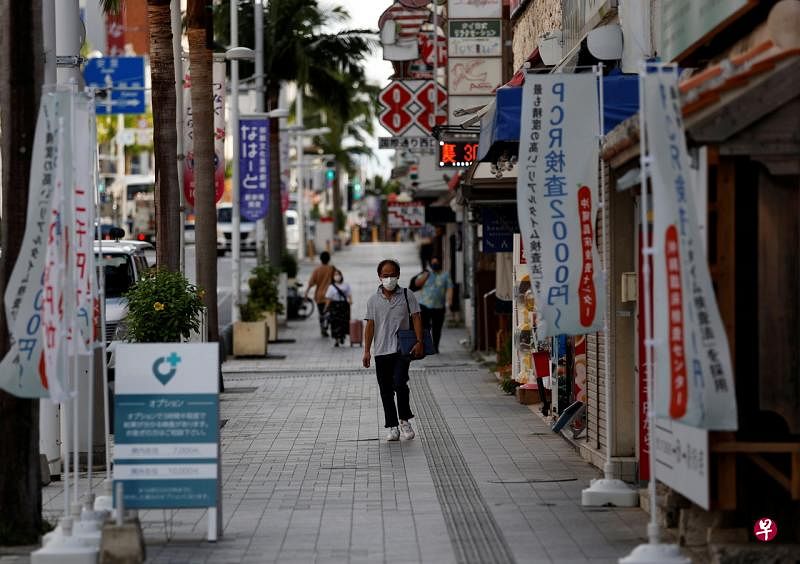Japan braces for Covid-19 wave as cases spike in Okinawa, Tokyo and Osaka
Sign up now: Get insights on Asia's fast-moving developments

Okinawa, which has a population of 1.47 million, recorded 623 cases on Jan 5, 2022.
PHOTO: REUTERS
Follow topic:
TOKYO - Japan is bracing for a sixth Covid-19 wave driven by the highly contagious Omicron variant, registering more than 2,000 cases on Wednesday (Jan 5) for the first time since Sept 26.
This comes as Okinawa, which is ground zero of the current spike, as well as metropolises from Tokyo to Osaka all recorded numbers that have not been seen in months. There were 2,638 cases nationwide on Wednesday.
Prime Minister Fumio Kishida, Japan’s third Covid-era leader now facing what seems to be the first real threat to his tenure, reiterated his vow to “assiduously and flexibly prepare for the worst-case scenario” including possible curbs on activity.
Much of Japan was under a state of emergency or the lighter “quasi-emergency” until September last year, with Covid-19 eventually proving to be the Achilles heel of Mr Kishida’s predecessor Yoshihide Suga.
Okinawa and Tokyo, as well as the western prefectures of Yamaguchi and Hiroshima, were considering asking for the “quasi-emergency” to be imposed, media reports said on Wednesday. The measure allows prefecture authorities to ask businesses to shorten opening hours, among other things.
The spike comes despite Japan having imposed one of the world’s strictest border control measures that are largely keeping out foreign students and businessmen – not to mention leisure travellers.
While Covid-19 cases are picked up at immigration among those who are allowed in – including returning citizens and resident foreigners – what has proven to be the weak link and has rankled the central government was the lax controls over returning American servicemen to United States military bases across the country.
Japan protested against the lax measures, with Chief Cabinet Secretary Hirokazu Matsuno saying on Wednesday that US military personnel have been made to take on-arrival polymerase chain reaction (PCR) tests and observe quarantine procedures since last Thursday.
But it may be too little, too late. Covid-19 infections in military bases do not count towards Japan’s overall tally, but many bases are already seeing mega-clusters and this could have perpetuated a spillover in cases to the general public.
Mr Matsuno, at his regular news conference, noted that there had been 412 cases linked to US bases in Okinawa between last month and Tuesday.
Okinawa, with a population of 1.47 million, recorded 623 cases on Wednesday. This was up from 225 on Tuesday and 130 on Monday, with Governor Denny Tamaki saying that he was “stunned” by the rapid surge in cases.
The US military base in Iwakuni in rural Yamaguchi prefecture, meanwhile, added another 182 Covid-19 cases on Wednesday to the 242 cases it has registered since last month. Yamaguchi prefecture, as a whole, recorded 104 cases on Wednesday, while neighbouring Hiroshima had 138 cases.
Elsewhere, the Omicron variant is set to become the dominant strain in metropolitan areas such as Tokyo, where the 390 cases on Wednesday was the highest figure since Sept 26.
Osaka set 244 cases in its highest figure since Oct 6, with neighbouring areas such as Kyoto, Nara and Shiga also reporting their highest numbers since September.
Osaka Governor Hirofumi Yoshimura said on Wednesday that the rate of transmission makes it unsustainable to hospitalise all Covid-19 patients, and vowed to secure 10,000 hotel rooms by the middle of this month to take in mild cases.
What will further complicate matters – and could potentially further the spread of the virus nationwide – is how millions of Japanese have travelled the country over the New Year season as they returned to their home towns or went on holiday amid a lull in Covid-19 cases.
Airlines reported a 92 per cent jump in domestic flight bookings over the New Year period as compared to last year, while shinkansen bullet train reservations were up by 90 per cent from a year ago.
The prefectures of Hokkaido, Yamanashi, Ishikawa and Tokushima were among those to have logged their first cases of the Omicron variant this week, all of which were tied to travellers who returned to their home towns over the New Year’s period.
Nonetheless, Mr Kishida pointed to three main thrusts that guide his Covid-19 response.
Japan approved its first oral Covid-19 treatment drug developed by US pharmaceutical firm Merck last month and aims to approve Pfizer’s oral treatment drugs as early as next month.
Since he took office in October, Japan has also added 30 per cent more hospital beds for Covid-19 patients, bringing the total to 37,000 beds from the previous 28,000 beds even at the height of the spread of the Delta variant in August, when hospitals were severely overwhelmed.
Mr Kishida also vowed to speed up the roll-out of Covid-19 booster shots in a campaign that only began last month. Just 0.5 per cent of the population have received their third doses as of Tuesday (Jan 4), while 78.5 per cent have had two jabs.

